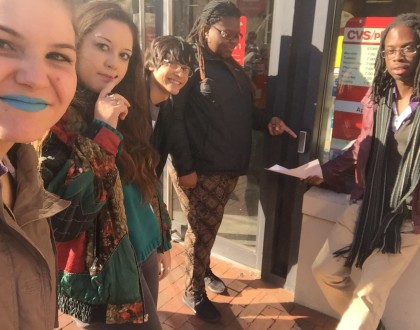The Long Road to Graduation

The InIt Class of 2016 is graduating next week!
InIt Graduation is one of my favorite events that we at YW Boston host, and not only because there’s free cake. During the ceremony, every delegation will present the results of their year-long Community Action Project at their high school. Seeing the collective impact of an InIt class, keeping in mind that all of these projects were organized and executed by high school students, is both inspiring and humbling.
In my role as YW Boston’s Program Performance and Evaluation Manager, obviously, impact is pretty exciting to me. But as we continue to celebrate the launch of Preparing Youth to Thrive, the social and emotional learning best practices field guide that InIt contributed to, I wanted to reflect on the process of getting delegates to move from brainstorming to impact. Though our delegates use many of the social and emotional learning skills in the course of their Community Action Projects, one of the stickiest to navigate, both for our staff and our youth, is teamwork.
Imagine being part of a delegation from a high school, maybe your fellow delegates are in your class, maybe they’re older or younger. You all have to work together to bring to life a Community Action Project that will benefit your school.
You may want to do a performance piece about the role of oppression in their daily lives, another delegate wants to a series of discussions on gender equity with small groups, and yet another delegate would prefer to do an advocacy campaign to make the school entrances more accessible to people with disabilities. Some delegates are filling out college applications, some are studying for SATs, and everyone is working hard to get their regular schoolwork done in addition to their sports practices, drama rehearsals, mock trial competitions, and chess club meetings. The teamwork skills youth build in InIt are essential for them to successfully come together and create the impactful projects we will see showcased at graduation next week.
Teamwork, as outlined by the SEL practices guide, involves three key youth experiences: trust and cohesion with peers; creating and maintaining effective working relationships; and collaborating and communicating in a team. InIt creates opportunities for youth to have these learning experiences during the year-long program. How do we do this? Read on!
The Foundation: Building trust and cohesion with peers
Of the key youth experiences, most of the process of building trust and cohesion with peers is done during Immersion Week. Youth spend long days together, exploring their own identities, building relationships with their peers, and understanding their place in their communities. According to the SEL practices guide:
The development of group identity and trusting relationships is seen in reduced defensiveness, increased supportive feedback, strengthening relationships, receiving focused attention, listening, physical affection, holding hands, and sharing. Development of trusting team relationships creates conditions for youth to begin practicing and honing skills and sensibilities for working together.
The team building work that is done during Immersion Week sets the stage for the work delegates do together for the rest of the year. Without the foundation built during Immersion Week, conflicts would be much more difficult to settle.
The Challenge: Creating and maintaining effective working relationships
When planning for a huge project like the Community Action Project, setbacks are inevitable. When YW Boston staff works with delegations, our goal isn’t to fix the problems ourselves, but rather to ensure that every group has the skills it needs to work through the problem as a team.
The Milton High School delegation ran into a setback when the administration told them that their planned assembly wouldn’t be logistically feasible. After weeks of planning for a presentation to their whole school, Milton had to think on their feet and reevaluate their plan while keeping their end goals in mind. Emily Conwell, the Youth Leadership Coordinator and delegation support for Milton High, said there were a number of challenges that the delegation had to navigate after their first idea was rejected: “There was a lot of discussion in the brainstorming phase. One delegate was risk-averse, assessing what could go wrong with each of the ideas they came up with in the next few meetings. Another delegate just wanted to move forward. They had some clashes.”
The Solution: Collaborating and communicating in a team
Emily didn’t intervene on behalf of any one student. Rather, she encouraged the students to find a respectful way to ensure everyone’s voices were heard, giving them the space to flex their social emotional learning muscles and resolve the issue on their own. The delegations did an asset assessment, and realized that the best way to move forward with their project, while minimizing logistical complications and ensuring their goals were met, was to resurrect a “Real Talk” group at their school. Their goal was to have two meetings, with 15 students each. Instead, 20 students attended each meeting.
The Celebration: Graduation!
Every delegation had their challenges to overcome, and that makes the delivery of the final product even sweeter. As InIt staff, we hope that impactful projects emerge from the process, but the real deliverable for me is a group of youth who understand the challenges they face in their communities and feel equipped to help become part of the solution.
Come see all the projects and chat with the delegates at InIt Graduation on May 5 at 6 pm, at the Nonprofit Center (89 South Street, Boston)! RSVP here: http://ywcaboston2.wpengine.com/event-list/init-class-2016-graduation/

